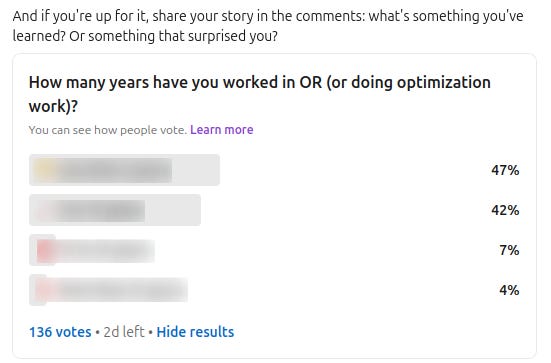📈 Understanding the present, local minima in quantum systems, why suboptimal solutions are sometimes the best
Local Optimum: short, imperfect-yet-useful ideas - Edition #19
Welcome to a new edition of Local Optimum: a short, imperfect-yet-useful collection of ideas related to optimization, decision-making, and applied Operations Research.
Let’s dive in! 🪂
1) ⏳ Understanding the present
George Orwell once said in his brilliant 1984 novel that:
Those who control the present, control the past and those who control the past control the future.
I’m tweaking it a little bit to say that:
Those who understand the past and understand the present will understand the future.
That’s why I’m putting a lot of effort on understanding the present of Operations Research as a field. This is done by posts and polls on LinkedIn, but also by writing this newsletter. This is what gives me time to think and act.
But I feel I lack some part of the history: the past.
I mean, of course anyone can understand how OR was conceived, the algorithms built for decades, and the big voices in the field.
I’m talking about the real-world problems tackled in the 70s, 80s, and 90s that shaped the field as it is today. Those war-rooms with big and ambitious projects that wanted to deliver value to the business in a context that is completely different than today’s.
No cloud, no big databases, no compute power, no memory. Just brains, models, and a lot of whiteboards.
If you worked on one of those projects or know someone who did, I’d love to hear from you. Let’s preserve and learn from that legacy.
And if you want to participate in a poll asking for your years of experience, it’s here (who will win the battle of experience?):
2) ↘️ Local minima in quantum systems
Some weeks ago I found this paper from Google.
It suggests that nature itself -when systems spontaneously cool- may be implicitly solving quantum-hard problems by finding local minima.
(…) We prove that a quantum computer can always find a local minimum efficiently using a thermal gradient descent algorithm that mimics natural cooling processes.
To establish the classical hardness of finding local minima, we construct a family of two-dimensional Hamiltonians such that any problem solvable by polynomial-time quantum algorithms can be reduced to finding local minima of these Hamiltonians.
Therefore, cooling systems to local minima is universal for quantum computation and, assuming that quantum computation is more powerful than classical computation, finding local minima is classically hard but quantumly easy.
Future directions highlighted include applying the algorithm to physically relevant Hamiltonians, exploring quantum advantage in classical optimization, and implementing the approach on near-term quantum devices, laying a foundation for practical quantum optimization methods.
The link to the paper, here.
3) 🎯 Why suboptimal solutions are sometimes the best
As models are a simplification of reality, a suboptimal solution may be better in practice.
Maybe having a super detailed model may make it impossible to solve in a reasonable time?
Maybe many details will not be the ones that tip the final decision?
Maybe we can start small and scaling the problem as needed?
Those are questions that Amazon knows how to answer, as well as professors in the space.
If you want to read more, here’s the full article:
Tractability is all you need
We’re in the final stage of Where did the time go? series of posts.
Remember this series of posts cover different aspects of tractability issues in optimization problems.
Throughout the series, we’ve discussed about benchmarking, large-scale optimization problems, symmetries, algorithms and parallelization, and the use of hardware.
Now we need to close the series with some not-so-random thoughts, so next Monday we’ll cover:
🪨 Understanding is the hard part
⚙️ Tractability drives our careers
🛠️ …And the way we work
If you want to understand the whole picture and think about tractability as a strategy for you to grow, this will be useful. See you Monday!
And that’s it for today!
If you’re finding this newsletter valuable, consider doing any of these:
1) 🔒 Subscribe to the full version: if you aren’t already, consider becoming a paid subscriber. You’ll get access to the full archive, a private chat group, and 30% off new products.
2) 🤝🏻 Collaborate with Feasible. I’m always looking for great products and services that I can recommend to subscribers. Also, if you want to write an article with me, I’m open to that! If you are interested in reaching an audience of Operations Research Engineers, you may want to do that here.
3) 📤 Share the newsletter with a friend, and earn rewards in compensation. You’re just one referral away from getting The Modern OR Engineer Playbook: Mindset, methods, and metrics to deliver Optimization that matters.
If you have any comments or feedback, just respond to this email!
Have a nice day ahead ☀️
Borja.






